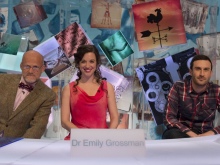Do duck quacks echo? Simon Foster chats about new science show

Imperial's Dr Simon Foster sets out to solve weird and wonderful science myths in a new programme beginning this week on Sky 1 HD.
Hosted by comedian Lee Mac,‘Duck Quacks Don’t Echo’ is a new panel show that puts science to the test. Seen as the voice of reason, Simon was quizzed by fact-obsessed celebrity panellists aiming to prove whether there is any truth behind the unbelievable and downright daft science theories they had heard to be true.
The shows goes to extraordinary lengths to prove remarkable theories true, including making Mock the Week regular Rhod Gilbert race against a shrimp do find out whether shrimps are fitter than humans (watch the show to find out who wins).
Scientific outreach is a central tenant of the College’s mission. Being funny is not part of the official job description for the College’s Outreach team, but maybe it should be.
Simon has been involved in a wide range of public engagement activities with the Physics department, check out his fantastic children’s Christmas lecture ‘It IS rocket science’. But being a science boffin on a national TV panel show is new territory.
In this interview Gail Wilson speaks with Dr Simon Foster, Physics Outreach Officer, about why he decided to take part in this experimental new science show and asks him to give us a preview of some of the more bizarre experiments to expect in the upcoming episodes. What made you decide to take part and what was your role on the show?
What made you decide to take part and what was your role on the show?
"I was actually really nervous about the show as I couldn’t figure out how you could mix comedy and science but also keep the integrity of what I do as a scientist. But I see it as a great way of reaching a whole new group of people who may not normally take any interest in science, in fact may be actively discouraged from watching science shows. So I see the show as a way of getting people interested in science, by stealth. And these are precisely the people we need to be communicating science to; it’s a huge missing audience, that hopefully will now take some interest in science. My role on the show was as a ‘verifier’, and basically it was my job to research the claims made by the other panellists and the audience members to see if they had any scientific rigour and then explain the underlying research in a way that could be more easily understood."
I see it as a great way of reaching a whole new group of people who may not normally take any interest in science, in fact may be actively discouraged from watching science shows.
– Dr Simon Foster
Outreach Officer, Department of Physics
What was the strangest science you had to test?
"Hmmm, pretty much everything was strange! The strangest one was when we made a human ‘baked Alaska’. One of the guests was covered in meringue and then Lee Mack uses a flame-thrower on the person. Amazingly the meringue is such a great insulator you can sit there blasting away at it, and the person covered will be perfectly fine. I believe it’s because a really good meringue will contain lots of tiny air bubbles. Air is a terrible conductor so the heat can penetrate the merengue. It’s the same reason birds and animals puff up their feathers and hairs as air gets trapped and keeps them warm."
How did you prepare?
"We were given a hint of what we might be asked, so I would spend several days reading research papers (believe it or not, but we really did) making notes to ensure we knew the science behind what was being brought up. It’s quite mad some of the science being researched! For example I was asked about a medical study that showed how playing the didgeridoo can cure snoring. Now this sounds like utter nonsense, but then I managed to dig out the research papers and it was actually true. So I spent a great deal of time reading some very, very odd research papers on asthma, breathing conditions, sleep apnea and lots of other weird and wonderful things. It was great as it really broadened my scientific horizons."
What is harder? Explaining science to a school kid, or a celebrity?
"Celebrities. I was trying to explain stuff to Johnny Vegas and I ended up having to give up. Kids really want to learn and are usually inquisitive so it’s a lot easier."
Were you worried that this type of comedy quiz show could belittle science?
"Yes, this was my biggest concern. Ok, I’ll admit it, I don’t have much of a reputation, but what little I do, I didn’t want to ruin. However, after chatting with the producers and actually seeing what they were planning, it was evident that they weren’t belittling science but showing how it’s all around us and how amazing it is, something that really connects with my own interests. I became interested in science at a very young age, not because I was interested in fundamental quantum theory or solar physics, but because something I saw caught my imagination. That’s what I hope this show will do, try and reignite that interest in people."
Who was funnier? Lee Mack or Carol Vorderman?
"Lee Mack, no question!"
And of course, we need to know. Do duck quacks echo?
"You’ll need to watch the show to find out."
'Duck Quacks Don’t Echo' will be broadcast every Friday from 7 February at 10pm on Sky 1 HD.
Article text (excluding photos or graphics) © Imperial College London.
Photos and graphics subject to third party copyright used with permission or © Imperial College London.
Reporter
Press Office
Communications and Public Affairs
- Email: press.office@imperial.ac.uk
